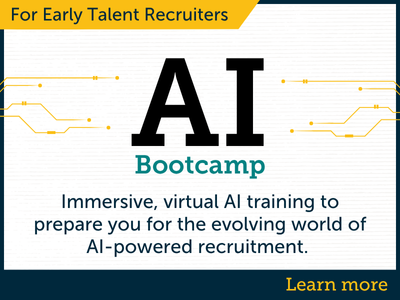The power of experiential learning to engage students in hands-on learning has become clear over the last couple of decades. Through multiple iterations of our annual student survey, NACE has consistently found that those engaged in experiential education benefit in multiple ways, including by garnering more job offers and a higher starting salary on average. In particular, our research shows that students who take part in a paid internship do better offer- and salary-wise than those who don’t participate at all.
The question is: Do these benefits extend beyond college and recent graduates’ initial job?
The answer appears to be: Yes—and by quite a bit.
Looking at Early Career Professionals
Although we have a wealth of data for college students, including graduating seniors, we have not had data related to the effects of experiential learning downstream—once the new graduate has transitioned to the workplace and has a year or more of experience on the job.

In 2024, and for the first time, we extended our analyses to early career professionals, those who are one to three years out of college, i.e., those graduating in 2021, 2022, or 2023.
Overall, just over four out of five early career professionals in our study reported engaging in some type of experiential learning. This included internships, externships, apprenticeships, co-ops, study abroad, faculty-led research projects, on-campus student work, practicum (or clinical) experiences, and microinternships. (See Figure 1.)
Effects of Experiential Learning on Early Career Professionals

Early career professionals who participated in any experiential learning reported several more positive—and crucially important—outcomes than their counterparts who did not participate in any experiential learning.
These benefits include:
- Faster than expected career progression;
- Higher rates of career satisfaction;
- Higher rates of having a mentor in the workplace;
- Higher rates of having a network to draw upon; and
- An average of $15,000 more in their salaries.
Although we cannot claim that experiential learning caused these outcomes due to the specific methodology used in these analyses, the outcomes are all directly related to the intended outcomes of experiential learning. Indeed, many experiential learning opportunities are structured such that experiential learners have a chance to test out a career path to see if it will be satisfying, and many programs are set up to pair a learner with a mentor and networking opportunities. Thus, it appears that many experiential learning opportunities are yielding the benefits for which they are designed, even into an experiential learner’s early career.

Salary and the Experiential Learner

While our findings show that that the overall average salary of experiential learners outpaced that of their nonexperiential learning counterparts, we recognize that salaries vary widely across major and industry. To address this, we dug deeper and looked at differences within industries, identifying five that had large enough sample sizes to support comparisons.
What we found is that, in four out of the five industries, experiential learners earned more than those who did not engage in experiential learning. (See Figure 4.) In some cases, the differences are quite large. We tested this finding by running the same analysis with data from our 2024 Student Survey; we found similar results for both majors and industries—dispelling the notion that industry explains the differences between experiential learners and their nonexperiential learning counterparts.
Conclusion: Experiential learning has a positive effect on salary.

Experiential Learning and the Value of Higher Education
The value proposition of higher education remains an important indicator of a successful college experience. Do Gen Z early career professionals see their college education as valuable?
Among our respondents, we found that experiential learners have a better impression of the value of the higher education they received from their respective institutions than do their nonexperiential learning counterparts.

We asked participants a set of questions about their views on the value of higher education, ranging from whether they would reenroll in college if given a “do-over” to whether they felt their institution prepared them well for their career. As Figure 5 illustrates, in most cases, the views of experiential learners varied markedly from those who didn’t engage in such learning.
In terms of our initial question, both groups expressed positive views of college, with 79% of experiential learners and 72% of nonexperiential learners saying they would pursue college again. In addition, both groups said they would pick the same school to attend, although experiential learners were more inclined to do so (76% versus 68%).

There are huge differences, however, in how the two groups view other aspects of their college experience. A case in point: A whopping 71% of experiential learners think their degree is relevant to their job compared to 56% of nonexperiential learners. This finding aligns with about half (49%) of experiential learners thinking their specific institution prepared them well for their career compared to 28% of nonexperiential learners who said the same.
It is important to recognize that it isn’t great news that fewer than half of experiential learners laud their institution’s career preparation efforts; however, the results do show that having students engage in experiential learning benefits the institution.
Another large difference is reflected in respondents’ views about paying back their student loans. Against the backdrop of a woefully small percentage of respondents who were confident in their ability to pay back their student loans in a “reasonable” amount of time (overall, only 35%), slightly more than 37% of experiential learners believe they are able to do so, compared with about 24% of nonexperiential learners. Moreover, both groups were nearly identical in the percentage that had actually paid off their loans to date—14.2% of experiential learners had paid them off, compared to 13.6% of nonexperiential learners. This finding shows that the experiential learners were simply more confident in their ability to earn a wage good enough to enable them to complete this weighty fiduciary obligation.

Internships Affect Career Success and Satisfaction
These new findings support the power experiential learning has on career success for college graduates: Whereas previous NACE research identified the effects on the graduate’s initial job offers and salary, these current findings demonstrate that the effects of experiential learning stretch beyond graduation, with positive impacts on salary and career progression. Indeed, these findings suggest that the benefits also extend to career satisfaction and perceptions about the value of higher education.
Experiential learning opportunities are designed to help students identify their best career path, engage in opportunities for mentorship and networking, and enhance their career prospects. Through this lens, these new results suggest that experiential learning is meeting those goals.
*****
About the Early Career Talent Survey: NACE conducted a survey of early career professionals who graduated with an undergraduate degree in the last 10 years (2014 through 2023). The survey covered a range of career development topics, including their experiential learning opportunities (internships, co-ops, clinical experiences, and so forth), career development trajectories, and sense of the value of their higher education.
Data were collected from August 21, 2024, to December 1, 2024. NACE sent the survey to NACE members at 2,761 colleges and employer organizations; the members then distributed the survey to their alumni and early career employees. Participants were offered a cash incentive and were encouraged to send the survey to their early career colleagues. Overall, a total of 5,031 individuals who fit the requisite time frame took part; of these 1,298 were Gen Z professionals who achieved their bachelor’s degree within the last one to three years—2021 through 2023. (See Figure 6 for a breakdown of their demographics.) The data presented in this article reflect the Gen Z responses. As nearly all questions were optional, response rates vary for each question. Please note: All of the differences between experiential learners and their nonexperiential learning counterparts discussed in this article have demonstrated statistical significance.






